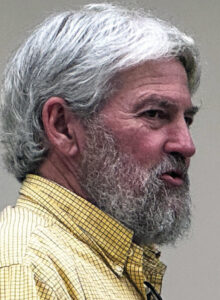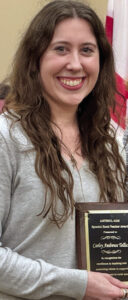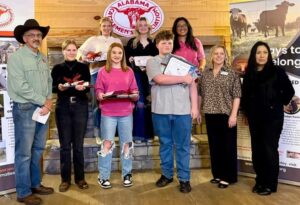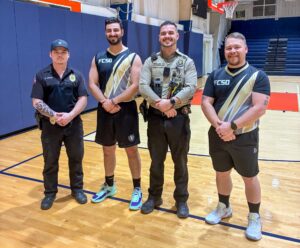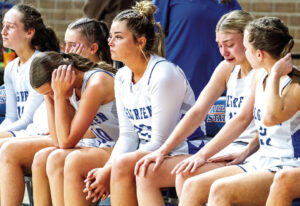Families forever linked by wartime friendship
Cecil Batchelor stood in front of Anna Lane Kennedy’s sixth grade social studies class at Russellville Middle School and smiled at the 20 or so children who had been recently learning about World War II.
Batchelor, a prominent businessman in the community, is a World War II veteran and he had come to talk to the class about his experiences – but in a way that was much different from the staid accounts they had no doubt read in their history books.
“I know you’ve probably heard many things about World War II,” Batchelor said by way of introduction, “but I want you to know there is a humanistic side to every war that’s ever been fought or ever will be fought.
“There are real people behind those stories and you should never condemn the residents of a country just because their leader did something bad.”
Batchelor then launched into an account of two young soldiers with seemingly opposite ideals on the surface who came to learn they shared the same common goals and desires – health, happiness and a piece of the American dream.
Batchelor was a young man just out of high school when he joined the United States Navy in the midst of World War II.
“At that time, every able-bodied male in the country was in the service,” he said. “I had a brother-in-law in the Navy and after his prompting, that was the branch I chose.”
Batchelor embarked on 12 weeks of basic military training and at the conclusion, he was added to the list of soldiers who were available to be called into active service.
“At that time, I was assigned to my ship’s company locally,” he said. “We patrolled out of Williamsburg, Va., looking for submarines and when I was assigned to the local company, I thought I wouldn’t be part of those drafted to go into the war.”
Batchelor said he was soon told by a ranking officer that he would remain in the draft, but when it came time to select names, Batchelor said his name had been deleted from the list and he was able to serve locally.
“I do believe there was a power much higher than I who made that possible,” Batchelor told the students, “because two days later, the ship I would have been placed on was torpedoed and sank.”
Little did Batchelor know at that time, but his purpose in the war was soon to be revealed.
He said the local Naval soldiers were each assigned a German prisoner of war – soldiers who had been captured in battle.
“They were supposed to help us with jobs and tasks, but we weren’t supposed to communicate with them beyond telling them what to do,” Batchelor said.
“I just found that hard to do with the soldier who had been assigned to me.”
George Giersburg was a young German soldier who had been captured and assigned to Batchelor’s care.
Both were interested in communicating so Batchelor helped Giersburg learn some simple English and in turn, Giersburg helped Batchelor learn basic German phrases.
“I was awed by George’s intelligence, and despite our orders, I began to get to know him and found out he really was a good person,” he said. “I cared about what happened to him and he became a close friend.”
Batchelor said they talked about many things – their hopes for the end of the war, their dreams for the future and what they planned to do once they were able to return to their homes.
“George knew that I was engaged to be married but we had decided to wait to get married until after the war was over,” he said. “I didn’t want to leave her a young widow in case something were to happen.”
Later on, following their conversation about Batchelor’s bride-to-be, Giersburg presented Batchelor with a hand-carved, wooden jewelry box that he had made while in his cell at night.
“George spent many night making me this jewelry box,” Batchelor said, as he pulled an ornately carved box out of a bag next to him.
The children’s eyes grew wide as they saw the beautiful gift that was handcrafted by a German soldier – someone supposed to be the enemy.
“It is something that has meant a great deal to me and something my wife, Olivia, still uses to this day.”
Batchelor said he and Giersburg continued their conversations while they worked, and he soon learned that Giersburg’s greatest hope was to come back to America once the war was over and live his life as an American.
Once the war was over and the German prisoners were being sent back overseas, Batchelor vowed he would make that happen.
“George took my address and I told him to keep in touch,” he said. “I wanted to help him any way that I could.”
Batchelor soon was released from service and returned home to marry his wife, Olivia, and soon began going to school.
“Before long, I got a letter from George who was working in England at a small college,” he said.
“We kept in contact, but when I moved to Russellville, we broke off communications, but I never forgot about him.”
Batchelor said several years later when he was teaching a Sunday School lesson at the church he attended, he talked about Giersburg and their experiences and it renewed the desire Batchelor first had to bring him back to America where he could have a better life.
“George only wanted what I was born with – to be an American.”
Batchelor began trying to track George down at the last address he had for him in England but found out George had moved back to Germany.
“I thought he was gone and that I would never be able to find him or see him again,” Batchelor said. “But I kept trying.”
One day during his search, Batchelor said he dialed the number for a public, community telephone in a German village.
“A lady answered the phone and I asked her if she knew George,” he said. “She told me that yes she knew him and if I would call at the same time the next day, she would have him waiting by the phone.
“When I dialed that same number the next day and I heard George answer, I said, ‘Mr. Giersburg, this is America calling.’”
Batchelor found out that George had married a woman by the name of Gerta and they had four children – Hans, twins Colin and Peter, and a daughter, Brigetta.
“We eventually got everything worked out and we brought them over on the Queen Elizabeth and they arrived in New York on February, 4, 1963 – exactly 50 years ago this month,” he said.
“My pastor had a friend who lived in New York and he met them and took them to the airport. When they got to Alabama, we picked them up and brought them home with us and they lived with us until we could find them a home.”
Batchelor said Giersburg had been employed as a general engineer in Germany and was able to find a job locally serving in that capacity.
“Their family went on to be great supporters of justice and they accomplished many things,” Batchelor said. “George and Gerta’s dream finally came true. They were able to have the life they had always dreamed of having for themselves and for their children.”
As the students sat in their desks, captivated by the story unfolding before them, Batchelor introduced a special guest who had been sitting inconspicuously at the back of the classroom.
“Do you remember me talking about George’s daughter, Brigetta?” he asked the class.
They dutifully nodded their heads.
“She is here today and she has brought her oldest daughter here as well,” he said as he gestured to the woman at the back of the class who is now known as Bridget Hovater.
The students began to clap and then turned their attention back to Bachelor who was visibly emotional.
“As I said at the beginning of this story, just because we disagree with a country doesn’t mean all the people are bad,” he said. “There are still good people everywhere and George was a great example. This German soldier became a great American.”


